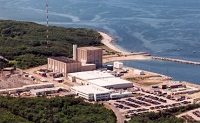Dave Lochbaum, appearing on behalf of the Union of Concerned Scientists, will be supporting the referendum. Russell Gocht, appearing on behalf of the American Nuclear Sociey, is a nuclear engineering graduate student at UMass-Lowell and will be opposing the referendum.
ANS has arranged live-tweeting of the debate via the ANS twitter feed @ans_org (https://twitter.com/ans_org).
This is the second of three nuclear-related public events in Massachusetts this week:
- Tuesday's radio panel featured Meredith Angwin and Richard Schmidt
- Tonight's FREEZE debate
- A forum on Thursday with Dave Lochbaum and others at MIT.

The Pilgrim plant
Please keep an eye on the twitter feed and take part in the social media conversations about the debate!
WHEN: Wednesday, April 25, 7-9 pm
WHAT: Freeze Pilgrim Forum. Plymouth, Mass.
http://freezepilgrim.org/news.html
WHERE: Plymouth South Middle School, Plymouth, Mass.
WHO: Russell Gocht, PhD student at UMASS Lowell, will be opposite David Lochbaum, of UCS. Lochbaum is expected to discuss UCS's report on the NRC's post Fukushima actions.
WHAT YOU CAN DO: Attend or follow the ANS live twitter feed: @ans_org or https://twitter.com/ans_org
___________________________










